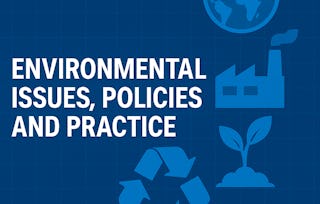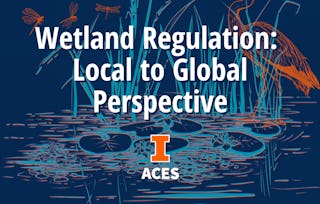Le droit de l'environnement est peut-être la seule institution qui nous sépare de l'épuisement de la planète. Il s'agit également d'une institution qui doit être réconciliée avec la liberté humaine et les aspirations économiques. Ce cours examine ces questions et propose un tour d'horizon des régimes juridiques existants régissant la pollution, le droit de l'eau, les espèces menacées, les substances toxiques, les analyses d'impact sur l'environnement et les risques environnementaux. Note : Le cours sur le droit et la politique de l'environnement ne sera plus accessible aux nouveaux apprenants à partir du 22 février 2019. Les apprenants déjà inscrits continueront à le voir sur leur tableau de bord Coursera tant qu'ils resteront inscrits au cours. Si vous êtes actuellement inscrit à ce cours, veuillez consulter l'annonce envoyée le 19 février 2019 pour plus de détails.

Introduction au droit et à la politique de l'environnement
Saisissez l'occasion de faire des économies ! Bénéficiez de 40 % de réduction sur 3 mois de Coursera Plus et d'un accès complet à des milliers de cours.

Introduction au droit et à la politique de l'environnement

Instructeur : Donald Hornstein
95 020 déjà inscrits
Inclus avec
3,202 avis
Compétences que vous acquerrez
- Catégorie : Climate Change Mitigation
- Catégorie : Environmental Laws
- Catégorie : Environmental Policy
- Catégorie : Law, Regulation, and Compliance
- Catégorie : Water Quality
- Catégorie : Pollution Prevention
- Catégorie : Environmental Issue
- Catégorie : Environment
- Catégorie : Water Resource Management
- Catégorie : Hazard Analysis
- Catégorie : Case Law
- Catégorie : Legal Research
- Catégorie : Environmental Regulations
Détails à connaître

Ajouter à votre profil LinkedIn
Découvrez comment les employés des entreprises prestigieuses maîtrisent des compétences recherchées

Il y a 7 modules dans ce cours
Instructeur

En savoir plus sur Droit
 Statut : Prévisualisation
Statut : PrévisualisationO.P. Jindal Global University
 Statut : Essai gratuit
Statut : Essai gratuitKhalifa University
 Statut : Essai gratuit
Statut : Essai gratuitUniversity of Illinois Urbana-Champaign
 Statut : Essai gratuit
Statut : Essai gratuitUniversity of Michigan
Pour quelles raisons les étudiants sur Coursera nous choisissent-ils pour leur carrière ?

Felipe M.

Jennifer J.

Larry W.

Chaitanya A.
Avis des étudiants
- 5 stars
86,44 %
- 4 stars
11,80 %
- 3 stars
1,37 %
- 2 stars
0,12 %
- 1 star
0,24 %
Affichage de 3 sur 3202
Révisé le 28 juin 2017
It was a good course, but I was little bit disappointed that it was very restricted to US only. I know the professor is from there, but a few cases from around the world would have been nice.
Révisé le 8 août 2020
Excellent course! Introduces the learners the wonderful world of environmental law - both conceptually and technically. Very well-paced and excellent compilation of cases from across the world.
Révisé le 7 nov. 2015
I was very satisfied with this course because it described the system and policy regarding Environmental Law in U.S., and provided the relationship between the current law and conventional nuisance.

Ouvrez de nouvelles portes avec Coursera Plus
Accès illimité à 10,000+ cours de niveau international, projets pratiques et programmes de certification prêts à l'emploi - tous inclus dans votre abonnement.
Faites progresser votre carrière avec un diplôme en ligne
Obtenez un diplôme auprès d’universités de renommée mondiale - 100 % en ligne
Rejoignez plus de 3 400 entreprises mondiales qui ont choisi Coursera pour les affaires
Améliorez les compétences de vos employés pour exceller dans l’économie numérique
Foire Aux Questions
Plus de questions
Aide financière disponible,
¹ Certains travaux de ce cours sont notés par l'IA. Pour ces travaux, vos Données internes seront utilisées conformément à Notification de confidentialité de Coursera.

